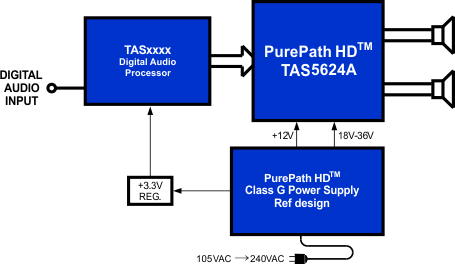SLAS844A May 2012 – January 2016 TAS5624A
PRODUCTION DATA.
- 1 Features
- 2 Applications
- 3 Description
- 4 Revision History
- 5 Device Comparison Table
- 6 Pin Configuration and Functions
-
7 Specifications
- 7.1 Absolute Maximum Ratings
- 7.2 ESD Ratings
- 7.3 Recommended Operating Conditions
- 7.4 Thermal Information
- 7.5 Electrical Characteristics
- 7.6 Electrical Characteristics - Audio Specification Stereo (BTL)
- 7.7 Electrical Characteristics - Audio Specification 4 Channels (SE)
- 7.8 Electrical Characteristics - Audio Specification Mono (PBTL)
- 7.9 Typical Characteristics
- 8 Parameter Measurement Information
-
9 Detailed Description
- 9.1 Overview
- 9.2 Functional Block Diagrams
- 9.3
Feature Description
- 9.3.1 System Power-Up and Power-Down Sequence
- 9.3.2 Start-Up and Shutdown Ramp Sequence
- 9.3.3 Unused Output Channels
- 9.3.4 Device Protection System
- 9.3.5 Pin-to-Pin Short-Circuit Protection (PPSC)
- 9.3.6 Overtemperature Protection
- 9.3.7 Overtemperature Warning, OTW
- 9.3.8 Undervoltage Protection (UVP) and Power-On Reset (POR)
- 9.3.9 Error Reporting
- 9.3.10 Fault Handling
- 9.3.11 Device Reset
- 9.3.12 System Design Consideration
- 9.4 Device Functional Modes
- 10Application and Implementation
- 11Power Supply Recommendations
- 12Layout
- 13Device and Documentation Support
- 14Mechanical, Packaging, and Orderable Information
Package Options
Mechanical Data (Package|Pins)
- DDV|44
Thermal pad, mechanical data (Package|Pins)
- DDV|44
Orderable Information
1 Features
- PurePath™ HD Integrated Feedback Provides:
- 0.025% THD at 1 W into 4 Ω
- > 65-dB PSRR (No Input Signal)
- > 105-dB (A-Weighted) SNR
- Preclipping Output for Control of a Class-G Power Supply
- Reduced Heat Sink Size Due to Use of 40-mΩ Output MOSFET With > 90% Efficiency at Full Output Power
- Output Power at 10% THD+N
- 150-W and 4-Ω BTL Stereo Configuration
- 300-W and 2-Ω PBTL Mono Configuration
- Output Power at 10% THD+N
- 125-W and 4-Ω BTL Stereo Configuration
- 250-W and 2-Ω PBTL Mono Configuration
- Click-Free and Pop-Free Start-Up
- Error Reporting Self-Protected Design With UVP, Overtemperature, and Short-Circuit Protection
- EMI-Compliant When Used With Recommended System Design
- 44-Pin HTSSOP (DDV) Package for Reduced Board Size
2 Applications
- Blu-ray™ and DVD Receivers
- High-Power Sound Bars
- Powered Subwoofer and Active Speakers
- Mini Combo Systems
3 Description
The TAS5624A device is a thermally-enhanced version of the class-D power amplifier based on the TAS5614A using large MOSFETs for improved power efficiency and a novel gate-drive scheme for reduced losses in idle and at low-output signals leading to reduced heat sink size.
The unique preclipping output signal can be used to control a Class-G power supply. This combined with the low idle loss and high power efficiency of the TAS5624A leads to industry leading levels of efficiency ensuring a super green system.
The TAS5624A uses constant voltage gain. The internally-matched gain resistors ensure a high power supply rejection ratio giving an output voltage only dependent on the audio input voltage and free from any power supply artifacts.
The high integration of the TAS5624A makes the amplifier easy to use; and, using TI’s reference schematics and PCB layouts leads to fast design in time. The TAS5624A is available in the space-saving, surface-mount 44-pin HTSSOP package.
Device Information(1)
| PART NUMBER | PACKAGE | BODY SIZE (NOM) |
|---|---|---|
| TAS5624A | HTSSOP (44) | 14.00 mm × 6.10 mm |
- For all available packages, see the orderable addendum at the end of the data sheet.
Typical TAS5624A Application Block Diagram

4 Revision History
Changes from * Revision (May 2012) to A Revision
- Added ESD Ratings table, Feature Description section, Device Functional Modes, Application and Implementation section, Power Supply Recommendations section, Layout section, Device and Documentation Support section, and Mechanical, Packaging, and Orderable Information section. Go